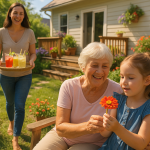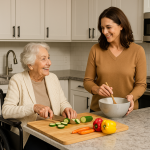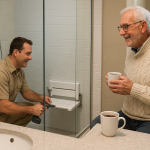Summer is here, and with it comes sunshine, outdoor activities, and warmer temperatures. As someone who works closely with older adults, I’ve seen how important summertime safety tips are—especially for seniors that have chosen to age in place.
The warm weather brings wonderful opportunities, but it also comes with risks we shouldn’t ignore. When temperatures rise, our older loved ones face higher risks of heat-related problems. In this guide, I’ll share practical advice to help seniors enjoy summer while staying safe and healthy.
Why Seniors Need Special Summertime Safety Tips
Our bodies change as we age. These changes can make dealing with heat harder for seniors:
- Our bodies don’t cool down as quickly
- We may not feel thirsty even when dehydrated
- Certain medications can make us more sensitive to heat
- Our skin becomes thinner and more vulnerable to sun damage
These factors can turn a pleasant summer day into a health emergency for older adults. That’s why having the right summertime safety tips is so important.
Stay Hydrated: The Summertime Safety Tips Keystone
Water is your best friend during hot weather. I can’t stress enough how important staying hydrated is for seniors.
How Much Water Do Seniors Need?
It’s recommended to drink at least 8-10 glasses of water daily, even if you don’t feel thirsty. Our sense of thirst weakens as we age, so you might not realize when your body needs water.
Here’s my daily hydration plan for seniors:
- Start your morning with a full glass of water
- Keep a refillable water bottle with you all day
- Set hourly reminders to take sips
- End your evening with another glass of water
Beyond Plain Water
“While I love my morning coffee as much as anyone, I’ve learned that drinks like coffee, tea, and alcohol can actually pull water from your body. During the summer, I try to enjoy them in moderation—and always chase them with a glass of water.”
Not a fan of plain water? Try these hydrating alternatives:
- Infused water with cucumber, lemon, or berries
- Fresh fruits like watermelon, strawberries, and oranges
- Clear broths and soups
- Caffeine-free herbal teas (served cold or hot)
Tired of plain water every day?
Staying hydrated doesn’t have to be boring. With just a few simple ingredients, you can turn water into something refreshing and enjoyable—without adding sugar or artificial flavors. Here are a few of my favorite senior-friendly drink ideas to keep things interesting:
🍋 Lemon-Cucumber Cooler: Add 2 slices of cucumber and 2 lemon slices to a pitcher of cold water. Let sit 1 hour before drinking.
🍓 Berry-Mint Refresher: Muddle 2 strawberries and a few fresh mint leaves into your water bottle. Shake gently and chill.
🍍 Ginger Citrus Sipper: Combine 1 slice of orange, a slice of pineapple, and a thin slice of fresh ginger in 16 oz of water.
Dressing Smart: Summertime Safety Tips for Clothing
What you wear affects how you feel in hot weather. I’ve found that the right clothing makes a huge difference for seniors during summer.
“As someone who’s spent decades working outdoors as a landscaper, I’ve learned firsthand how important the right summer clothing can be. I still spend a lot of time outside doing physical work—even in the heat—and I never skip a few key basics. A wide-brimmed hat with a neck flap keeps the sun off my face and ears, while lightweight, long-sleeved shirts made from breathable fabrics protect my arms without overheating me. I also recommend wraparound sunglasses with full UV protection—they make a big difference on those bright days. Smart clothing choices aren’t just about comfort—they help prevent sunburn, dehydration, and heat stress.”
Choose the Right Fabrics
This is what I suggest:
- Lightweight, loose-fitting clothes
- Natural fabrics like cotton and linen that let your skin breathe
- Light colors that reflect sunlight instead of absorbing it
The key is to avoid dark colors and synthetic materials that trap heat and sweat.
Don’t Forget Protective Gear
Your summer wardrobe should include:
- A wide-brimmed hat to shade your face and neck
- Sunglasses that block UV rays to protect your eyes
- A light, long-sleeved shirt for extended outdoor time
- Comfortable, supportive footwear that won’t cause blisters
I keep a summer safety kit by the door with these items so they’re never forgotten.
Sun Protection: Summertime Safety Tips for Aging Skin
As we age, our skin becomes more vulnerable to sun damage.
“I’ve found that spray or even the roll-on type of sunscreen products work well for seniors with arthritis who might struggle with applying lotions.”
The Right Way to Apply Sunscreen
Here’s my foolproof sunscreen routine:
- Pick a sunscreen (broad-spectrum) with an SPF of 30 or higher
- Apply sunscreen 30 minutes before going outside
- Use about a shot glass amount for your entire body
- Don’t forget often-missed spots like ears, neck, and feet
- Reapply sunscreen at two-hour intervals—more often if swimming or sweating
Timing Your Outdoor Activities
I always plan outdoor activities around the sun’s schedule:
- Early morning (before 10 AM) is best for gardening and walking
- Late afternoon (after 4 PM) is safer for sitting outside
- Midday hours should be spent in air-conditioned spaces
When older adults follow this schedule, they enjoy summer without the dangerous midday heat.
Creating a Cool Home Environment
Your home should be a cool retreat from summer heat.
Cooling Without Breaking the Bank
Even without central air conditioning, you can keep your home comfortable:
- Close blinds and curtains during the day to block heat
- Open windows in the evening to let cool air in
- Use ceiling fans to circulate air (make sure they spin counterclockwise in summer)
- Place bowl of ice in front of a fan for DIY air conditioning
There may be energy assistance programs worth applying for if air conditioning costs are a concern.
Setting up a Cooling Station
I recommend creating a designated cooling area in your home:
- Choose the coolest room in your house
- Set up comfortable seating
- Keep water and snacks nearby
- Have entertainment like books, puzzles, or TV
- Make sure a phone is within reach
This becomes your safe space during heat waves or power outages.
Safe Exercise: Staying Active with Summertime Safety Tips in Mind
Staying active is important for seniors, even during hot weather. I work with older adults to adapt their exercise routines for summer.
Water Exercises: Perfect for Summer
I often recommend water-based activities because they:
- Keep your body cool while you move
- Reduce pressure on joints
- Provide natural resistance for strength building
- Are usually available in air-conditioned facilities
Many community centers offer senior water exercise classes with trained instructors.
Indoor Exercise Options
When it’s too hot outside, try these indoor activities:
- Mall walking in air-conditioned shopping centers
- Chair yoga or tai chi at home—just make sure the space is clear and safe and consider asking a family member or caregiver to be nearby the first few times.
- Light strength training with resistance bands
- Stationary biking while watching TV
Try to limit exercise to early in the day when energy levels are high.
Recognizing Heat-Related Illness
Knowing the warning signs of heat problems can save lives. Learn what the symptoms to watch out for look like.
Heat Exhaustion Signs
Watch for the following signs of heat exhaustion, especially during prolonged heat exposure. These symptoms can come on gradually or suddenly—don’t ignore them:
- Excessive or constant sweating
- Skin that feels clammy, cool, or looks unusually pale
- Rapid heartbeat with a weak pulse
- Feeling nauseated or throwing up
- Cramping muscles, especially in the legs or arms
- General fatigue or feeling drained
- Sudden bouts of lightheadedness
- Aching head or pressure behind the eyes
- Brief loss of balance or fainting spells
Be aware that heat exhaustion can quickly become heat stroke if not treated.
Heat Stroke: A Medical Emergency
Seek immediate medical help for:
- High body temperature (103°F or higher)
- Hot, red, dry, or damp skin
- Fast, strong pulse
- Confusion
- Loss of consciousness
I can’t stress enough that heat stroke is an emergency—call 911 right away if you suspect it.
Medication Management: A Key Summertime Safety Tip for Seniors
Many seniors take medications that can be affected by heat or make heat harder to tolerate. I recommend reviewing medication concerns before summer arrives.
Heat-Sensitive Medications
Be extra careful with these types of medicines during hot weather:
- Water pills (diuretics)
- Blood pressure medications
- Antihistamines
- Some psychiatric drugs
- Parkinson’s disease medications
I suggest talking to your doctor or pharmacist about all your medications before summer starts.
Proper Medication Storage
Heat can damage medications. I recommend:
- Keeping medicines in the coolest part of your home
- Never leaving medications in a hot car
- Checking storage instructions for each medication
- Using insulated medication travel bags
I recommend that seniors set up medication reminder systems that include proper storage.
Backup Plans for Power Outages:
Summer storms can knock out power when you need air conditioning most, emphasizing the need for emergency plans.
Create a Summer Emergency Kit
Have you set aside a summer emergency kit yet?
When the power goes out during a heatwave, even a short outage can quickly become dangerous—especially for older adults aging in place. That’s why I always recommend building a simple summer kit ahead of time. Here’s a list of must-have items I suggest including, along with a quick explanation of why each one matters:
| Item | Why It’s Important |
|---|---|
| Battery-powered fans | Helps cool the air during power outages when A/C is unavailable. |
| Extra batteries | Keeps essential devices like fans, flashlights, and radios running. |
| Cooling towels or ice packs | Provides instant relief from heat and helps regulate body temperature. |
| Non-perishable food | Offers sustenance if cooking isn’t possible during an outage. |
| Plenty of drinking water | Staying hydrated is crucial during heatwaves or emergencies. |
| Flashlights or lanterns | Essential for navigating safely in low light during power loss. |
| Charged power bank | Keeps your phone charged to stay in touch or call for help. |
| List of emergency contacts | Ensures you can reach help quickly if needed. |
It’s good practice to update this kit every spring before hot weather arrives.
Emergency Cooling Plans: Know Where to Go
Make sure you know where to go.
- The location of local cooling centers
- Which family members or neighbors can help in an emergency
- How to get emergency transportation if needed
- When it’s time to leave home for a cooler location
Having these plans in place brings peace of mind to seniors and their families.
Summer Travel: Summertime Safety Tips While Away
Many seniors travel during summer months. I share these tips to keep trips safe and enjoyable.
Plan Travel around Weather
I advise that seniors:
- Choose destinations with milder climates
- Travel during cooler months if possible
- Book accommodations with air conditioning
- Allow for rest days between activities
Planning ahead makes travel much more comfortable for seniors.
Pack for Safety
Your summer travel bag should include:
- All necessary medications
- A hat and sunglasses
- Sunscreen
- A refillable water bottle
- Light layers of clothing
- Medical information card
- Phone numbers for doctors
Review packing lists before any trips to make sure nothing is forgotten.
Social Connections: A SUMMERTIME Safety Tip OFTEN OVERLOOKED
Staying connected with others is a vital part of summer safety for seniors. I encourage all seniors, aging in place, to maintain social ties during hot weather.
Check-in Systems
It’s important to set up:
- Daily phone call schedules with family or friends
- Neighbor check-in plans
- Smart devices that allow family to monitor home temperature
- Regular video calls with loved ones
These connections ensure help arrives quickly if needed.
Community Resources
I suggest seniors connect with:
- Senior centers with air conditioning
- Library programs during summer months
- Meal delivery services for hot days
- Transportation services to help them get to cool locations
Building a support network is one of the most important summertime safety tips I share.
Embracing Summer With Confidence
“Looking for more ideas on aging in place safely in the sun? Bookmark this page and check back soon—I’ll be sharing tips on accessible gardening and landscaping ideas for seniors in an upcoming article.”
With these summertime safety tips, seniors can enjoy warm weather while staying healthy. I’ve seen how following these guidelines helps older adults make the most of summer without putting their health at risk.
Final Thoughts
Remember, summer should be a time of joy, not worry. By taking simple precautions and planning ahead, seniors can safely enjoy all the season has to offer. Whether you’re a senior yourself or caring for an older loved one, these summertime safety tips provide the foundation for a happy, healthy summer.
“ Tip: Print this article or share it with a friend who might need a summer safety reminder. A small action today could prevent a big problem tomorrow.”
I hope these suggestions help you or your loved ones stay safe this summer. With the right preparation and knowledge, summer can be a wonderful time for seniors to enjoy life to the fullest.
(This article is for informational purposes only and is not a substitute for professional medical advice. Always consult with a healthcare provider regarding health concerns or before making significant changes to health routines.)






